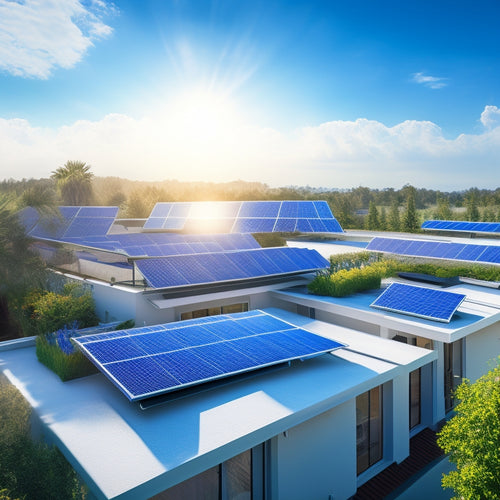
Benefits of Home Solar Systems
Share
By installing a home solar system, you'll reduce your energy bills considerably, potentially saving up to $500 annually. You'll also enhance your property value by up to 17%, making your home more attractive to potential buyers. Plus, you'll contribute to a cleaner environment by reducing your carbon footprint and reliance on fossil fuels. With government incentives, long-term savings, and low maintenance costs, the benefits of home solar systems are clear. As you investigate this option further, you'll uncover even more advantages that make switching to solar a smart investment for your wallet and the planet.
Key Takeaways
- Home solar systems reduce energy bills by generating electricity on-site and providing credits for excess energy fed back into the grid.
- Installing solar panels can increase property value by up to 17% and attract potential buyers who value eco-friendly homes.
- Solar systems provide a long-term investment with returns exceeding 10%, depending on system size and energy rates, and lock in low energy rates for years.
- Home solar systems promote environmental sustainability by reducing carbon footprint, mitigating climate change, and producing clean energy with minimal water usage.
- Solar panels require minimal maintenance, lasting 25-30 years, and operate efficiently in extreme temperatures, ensuring consistent clean energy production for decades.
Reduces Energy Bills
With the rising costs of electricity, homeowners are constantly seeking ways to reduce their energy expenses. You're no exception, and you're considering installing a home solar system to cut down on your energy bills. You're on the right track.
Home solar systems can considerably reduce your energy expenses, and the benefits are twofold.
To begin with, solar panels generate electricity on-site, allowing you to consume it directly. This reduces your reliance on the grid, resulting in lower electricity bills. In addition, you can benefit from net metering, which measures the excess energy your solar panels produce and feeds it back into the grid. You'll receive credits for this excess energy, further reducing your energy expenses.
To make the shift to solar energy more affordable, solar panel financing options are available. These financing options enable you to install a solar system with little to no upfront costs.
Environmentally Friendly Option
When you install a home solar system, you're taking an important step towards reducing your carbon footprint.
By utilizing energy from the sun, you're tapping into a clean energy source that doesn't contribute to climate change or air pollution.
As you work to achieve a zero-emissions goal, a home solar system is an essential investment in a sustainable future.
Reduce Carbon Footprint
Every hour, enough solar energy hits the Earth to power human civilization for an entire year, yet a considerable portion of our energy still comes from fossil fuels, contributing to climate change. By installing a home solar system, you can greatly reduce your carbon footprint and contribute to a more sustainable future.
Here's a comparison of the carbon footprint of different energy sources:
| Energy Source | CO2 Emissions (kg/MWh) |
|---|---|
| Solar Energy | 15 |
| Wind Energy | 10 |
| Natural Gas | 360 |
| Coal | 1,000 |
As you can see, solar energy has a markedly lower carbon footprint compared to traditional fossil fuels. By switching to a home solar system, you'll reduce your reliance on fossil fuels and lower your carbon emissions. This not only benefits the environment but also contributes to a more sustainable living and renewable energy future. With a home solar system, you'll be taking a considerable step towards reducing your carbon footprint and promoting a cleaner, healthier environment.
Clean Energy Source
You're choosing a clean energy source by installing a home solar system, which is an environmentally friendly option that benefits the planet and your community.
This decision supports the shift towards renewable resources, reducing our reliance on finite fossil fuels. By utilizing the power of the sun through solar technology, you're contributing to a cleaner, healthier environment.
Some key benefits of a clean energy source include:
-
Renewable energy: Solar power is a sustainable resource, unlike fossil fuels which are finite and contribute to climate change.
-
Reduced air pollution: Solar energy produces no emissions, reducing air pollutants and improving local air quality.
-
Water conservation: Unlike traditional power plants, solar panels require minimal water for operation, conserving this essential resource.
- Energy independence: With a home solar system, you're less reliant on the grid, reducing your energy bills and increasing your energy autonomy.
Zero Emissions Goal
Regularly, homeowners who install solar systems set their sights on a zero-emissions goal, making a notable impact on the environment. You can considerably reduce your carbon footprint by utilizing the power of the sun, and solar technology advancements have made it more accessible than ever.
With the ability to generate clean energy on-site, you'll be producing no emissions or pollution, contributing to a healthier environment for future generations.
As you aim for a zero-emissions goal, you'll also be supporting renewable energy policies that promote sustainable development. By investing in solar energy, you're investing in a cleaner, more sustainable future.
Additionally, solar systems require minimal maintenance and can last for decades, making them a reliable choice for homeowners who want to reduce their environmental impact.
With the cost of solar panels decreasing and energy storage options improving, achieving a zero-emissions goal is becoming increasingly feasible. By going solar, you'll be taking a notable step towards reducing your reliance on fossil fuels and mitigating climate change.
Increases Property Value
You'll likely see a significant increase in your selling price when you decide to sell your home, thanks to the addition of a solar system.
Additionally, the sleek, modern design of solar panels can enhance your home's curb appeal, making it more attractive to potential buyers.
Boosts Selling Price
Installing a home solar system can enhance your property value by up to 17% according to a National Renewable Energy Laboratory study, making it a worthwhile investment for homeowners.
This increase in selling price is driven by market trends and buyer preferences, which increasingly prioritize energy efficiency and environmental sustainability.
Some key benefits that contribute to this elevated property value include:
-
Increased buyer demand: Solar-powered homes are in high demand, and buyers are willing to pay a premium for them.
-
Reduced energy costs: Solar panels can greatly reduce your energy bills, making your home more attractive to potential buyers.
-
Government incentives: You may be eligible for tax credits and rebates for installing a solar system, which can increase your property value.
- Long-term savings: Solar panels can last for decades, providing long-term savings and increasing your home's appeal to buyers.
Enhances Curb Appeal
One of the most significant advantages of home solar systems is that they can instantly improve your property's visual appeal, making it more attractive to potential buyers and increasing its resale value.
A well-designed solar panel installation can raise your home's curb appeal, giving it a sleek, modern look that sets it apart from neighboring properties. This is achieved through careful consideration of solar panel aesthetics, ensuring that the system blends seamlessly with your home's design.
By integrating solar panels into your roof's layout, you can create a cohesive, streamlined appearance that adds to your property's visual appeal. This attention to architectural integration is essential, as it allows the solar system to complement your home's existing features rather than detract from them.
The result is a property that looks modern, sustainable, and highly desirable – a major selling point for potential buyers.
Long-Term Investment
A notable benefit of home solar systems is the long-term investment they provide, which directly translates to enhanced property value. As you consider financial planning for your home, investing in a solar system can yield considerable returns.
In fact, a study by the National Renewable Energy Laboratory found that homes with solar systems sell for up to $15,000 more than similar homes without them.
Here are some key benefits of home solar systems as a long-term investment:
-
Enhanced property value: As mentioned, solar systems can greatly increase your home's value, making it more attractive to potential buyers if you decide to sell in the future.
-
Investment returns: Solar systems can provide a return on investment of up to 10% or more, depending on the system's size and your local energy rates.
-
Low maintenance costs: Solar systems require minimal maintenance, reducing the likelihood of unexpected expenses down the line.
- Long-term savings: By generating your own clean energy, you can lock in low energy rates for years to come, saving you money on your utility bills.
Low Maintenance Cost
Switching to a home solar system can considerably reduce your maintenance costs. During the installation process, solar panels are designed to last for decades, and their durability minimizes the need for frequent repairs or replacements. You'll enjoy a significant reduction in maintenance expenses, as solar panels have no moving parts and are resistant to corrosion.
Here's a breakdown of the low maintenance costs of home solar systems:
| Aspect | Description |
|---|---|
| Repair Frequency | Rarely needed, with an average of 1-2 repairs per year |
| Replacement Cycle | 25-30 years or more for solar panels, 10-15 years for inverters |
| Cleaning Requirements | Occasional cleaning to guarantee peak energy output |
| Monitoring and Inspection | Regular monitoring and inspection to verify system performance |
Energy Independence Guaranteed
As you employ the power of solar energy, you're freed from reliance on utility companies and their fluctuating rates, guaranteeing energy independence for your home. This means you're in control of your energy consumption and production, enjoying the benefits of energy autonomy.
With a home solar system, you're no longer at the mercy of utility companies and their unpredictable price hikes.
Some key advantages of energy independence include:
-
Reduced reliance on the grid: You're less dependent on the grid, reducing the likelihood of power outages and interruptions affecting your daily life.
-
Stable energy costs: With solar energy, you can lock in a fixed energy rate, shielding you from rising utility costs.
-
Increased solar resilience: Your home solar system provides a reliable source of energy, even during extreme weather events or grid failures.
- Enhanced energy security: You're producing your own clean energy, reducing your reliance on fossil fuels and enhancing your energy security.
Government Incentives Available
Nearly every homeowner who installs a solar panel system can take advantage of government incentives, considerably reducing the upfront cost of going solar. You'll be pleased to know that there are various incentives available at the federal, state, and local levels.
| Incentive Type | Description |
|---|---|
| Federal Tax Credits | 26% of total system cost as a tax credit |
| State Rebates | Varying amounts based on system size and location |
| Local Incentives | Property tax exemptions, installation subsidies, and more |
In addition to these incentives, you may also be eligible for financing options, renewable energy certificates, solar grants, and tax deductions. Utility programs and energy efficiency programs can also provide additional benefits. By taking advantage of these incentives, you can considerably reduce the cost of installing a solar panel system, making it a more affordable and attractive option for your home. Don't miss out on these opportunities to save money and increase your energy independence.
Durable and Long-Lasting
With your solar panel system in place, you can enjoy the peace of mind that comes with knowing it will provide you with clean energy for years to come.
The durability and long lifespan of solar panels guarantee that your investment will pay off over time.
Solar panels are built to last, with a typical solar panel lifespan of 25 years or more. They're also designed to withstand various weather conditions, including:
- Heavy rain and hail: Solar panels are tested to resist impact from hailstones up to 1 inch in diameter, guaranteeing they can withstand harsh weather conditions.
- High winds: Solar panels are securely fastened to your roof to resist winds of up to 140 mph.
- Extreme temperatures: Solar panels are designed to operate efficiently in temperatures ranging from -40°C to 85°C (-40°F to 185°F).
- UV radiation: Solar panels are built with UV-resistant materials to prevent degradation from sun exposure.
With a solar panel system, you can rely on a consistent source of clean energy for decades to come.
Zero Carbon Emissions
Zero Carbon Emissions
Your home solar system produces electricity without emitting any carbon dioxide, sulfur dioxide, or nitrogen oxide - a major advantage over traditional fossil fuels. This means you're not contributing to climate change or air pollution, making you an environmentally responsible homeowner.
With solar panel technology, you're utilizing renewable energy from the sun, which is abundant and clean.
By going solar, you're reducing your carbon footprint considerably. According to the U.S. Energy Information Administration, a typical residential solar panel system can reduce CO2 emissions by 3 to 4 tons per year.
That's equivalent to planting over 100 trees annually. This reduction in greenhouse gas emissions not only benefits the environment but also contributes to a healthier community by reducing air pollution.
Frequently Asked Questions
Can I Install Solar Panels on an Old or Historic Home?
You'll need to maneuver through historic preservation regulations and local installation regulations before installing solar panels on your old or historic home, ensuring that the system complements the property's character while meeting your power needs.
Will Solar Panels Affect the Appearance of My Roof?
Will your historic home's charm be compromised by solar panels? Probably not, since you'll choose from various roofing materials and designs that blend seamlessly with your existing aesthetic, ensuring a sleek, modern look that complements your home's character.
Do Solar Panels Work During Power Outages?
During power outages, you won't get electricity from solar panels alone, but with battery storage, you can enjoy off-grid living, as the stored energy provides backup power, ensuring your home remains lit and functional when the grid goes down.
How Do I Clean and Maintain Solar Panels?
You'll guarantee optimal energy harvesting by implementing regular solar panel maintenance, using gentle cleaning techniques like soft-bristled brushes and deionized water to remove debris, and scheduling bi-annual inspections to detect potential issues.
Can I Add More Solar Panels to My Existing System?
You can add more solar panels to your existing system if they're compatible, ensuring seamless integration; investigate system expansion options with your installer, considering factors like roof space, electrical capacity, and local building codes to maximize energy output.
Related Posts
-

What You Need to Know About Permits and Inspections
You need to navigate the complex landscape of permits and inspections to guarantee your project complies with local z...
-

Step-by-Step Guide to Converting Your Vehicle to EV
You'll begin by evaluating your vehicle's conversion potential, analyzing its weight, aerodynamics, and powertrain co...
-

Best Solar Panel Options for Maximum Energy Savings
You can maximize your energy savings with solar panels that boast efficiency ratings above 20%, paired with extensive...


